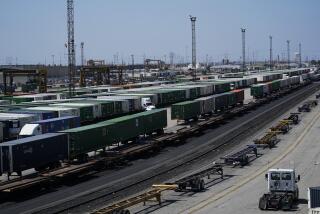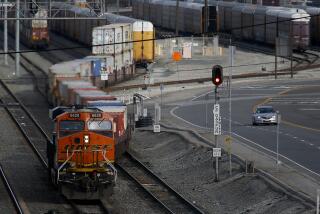Readers React: Environmental rules don’t demand job-killing automation at the Port of L.A.
To the editor: APM Terminals is not telling the truth about its reason for pushing automation at the Port of Los Angeles. Clean air and water rules do not require automation at the port.
Yes, the public’s health requires that we change from diesel to electric power to fuel yard and other port equipment, but electrification can be done without automation and elimination of jobs. No environmental or government group or agency has asked for or required job cuts to improve air quality.
The Los Angeles basin has failed to meet federal air quality standards for decades. We who live in the diesel death zone by the ports — and who want clean air for our children, seniors and others — support the dockworkers’ union in standing up to APM Terminals, which simply wants to pocket increased profits through automation and put the blame for job losses on environmental improvements.
Peter M. Warren, San Pedro
The writer is treasurer of the San Pedro and Peninsula Homeowners Coalition.
..
To the editor: A little more than 200 years ago in England, the Luddites attempted to halt the introduction of more productive equipment in the textile industry. It mattered not that abundant, lower-cost fabrics were clearly in need, or that expansion in their industries could lead to better paid and more fulfilling jobs.
In the longer run, failure to update and automate pretty much killed the whole textile industry there.
Fast-forward to our local ports. Some automation and modernization have already been introduced, and it’s fair to say that numerous port workers, though not all, have already been lifted from basic manual laborers’ wages to quite comfortable income levels.
It is difficult to forecast what job any of us may be doing five years from now and “the new” always needs some effort to master, but time and time again it has been the innovators who have ended up ahead. Let’s hope that all the parties involved at the port can manage to keep an eye on the longer-term viability of this important infrastructure.
Ian Sanderson, Rancho Palos Verdes
Follow the Opinion section on Twitter @latimesopinion and Facebook
More to Read
A cure for the common opinion
Get thought-provoking perspectives with our weekly newsletter.
You may occasionally receive promotional content from the Los Angeles Times.










